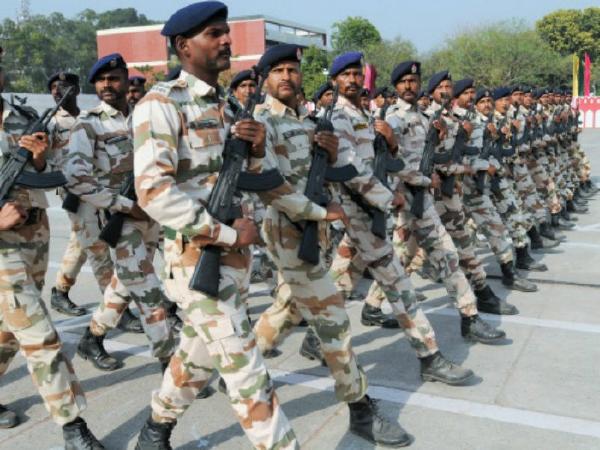GREATER NOIDA: The ITBP has drafted a proposal to enhance its surveillance and intelligence gathering skills along the China border even as it has for the first-time introduced ‘war games’ exercises for its commanders to better prepare them for all types of conflicts on the disputed and icy terrain, officials said Thursday.
Officiating at the 57th raising day of the force here, Home Minister Rajnath Singh said the government has also decided to create ‘integrated composite border posts’ for Indo-Tibetan Border Police (ITBP) in forward areas so that troops deployed in these hard areas and amid sub-zero temperatures are able to get water in liquid form and the temperature inside is controlled at 20-22 degrees.
Chief of the force R K Pachnanda said they have sent a proposal to the Union home ministry for implementing a comprehensive integrated border management system (CIBMS) along the 3,488-km Sino-India border so that all tech-based tools for border guarding are collaborated for better results.
A senior official said the aim of the project is to integrate the surveillance gadgets, long range reconnaissance devices, radars and cameras onto a smart platform so that technology and gadgets will man large areas of this inhospitable terrain, on similar lines of what has been deployed as part of a ‘smart fence’ pilot project by the BSF along the Pakistan border.
The areas which are snow-laden, face arduous climate and are in hard mountainous terrain can be covered by the CIBMS project and an eye can be kept on any movement at this frontier, he said.
The 90,000-strong force has also decided to introduce war games exercises, by way of tech-enabled tools, for its commanders as part of their refresher courses and training curriculum. This entails testing the decision making skills of military formation leaders over a simulated presentation of a war or conflict-like situation.
In order to enhance its footprint along this border, the border guarding force has also begun opening ‘tactical headquarters’ for all of its border units along the India-China border. Tactical headquarters is a base which is located deep inside the border area and is operated by a senior officer and his armed contingent.
“Joint exercises and war games have been introduced to enhance the professional and operational effectiveness of the force personnel,” the ITBP director general said.
The force has also opened a maiden intelligence training school to “further strengthen” its snoop collection capabilities during operations.
Also, a new ‘security training centre’ has been launched in the paramilitary force to train ITBP commandos in close-quarter combats and advanced fighting skills for all types of challenges on the border or in the hinterland.
The force has already started imparting basic training of the Mandarin language for its personnel so that they can better communicate with their Chinese counterparts during official meeting and also at the time of standoffs or confrontation at this border where incidents of incursion are very frequent.
The home minister, during the event, said the government has recently provided “high-powered SUVs, all-terrain vehicles and snow scooters” to the ITBP for enhancing their operational prowess.
He added that authorisation has already been given to the force to hire two helicopters for its dedicated use to supply rations and manpower to those border posts along the China border which can only be reached by air.
A special decoration has also been introduced in the force for those personnel who render exceptional or gallant service during their deployment in Afghanistan.
The ITBP is mandated to guard the Indian Embassy and its various consulates in the war-torn country and these facilities have faced numerous terror attacks in the past.
The mountain-warfare trained ITBP was raised in 1962 in the aftermath of the Chinese aggression. (AGENCIES)


